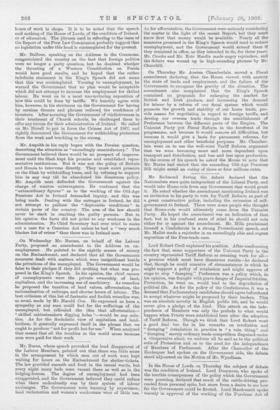On Thursday Mr. Austen Chamberlain moved a Fiscal amendment declaring
that the House viewed with anxiety the state of trade and employment, and the failure of the Government to recognise the gravity of the situation. The amendment also complained that the King's Speech contained no proposals for enlarging the market for British and Irish produce, and increasing the demand for labour by a reform of our fiscal system which would promote the growth and stability of our home trade, pro- vide means for negotiation in regard to foreign tariffs, and develop our oversee, trade through the establishment of Preference between the different parts of the Empire. The Unionist Party put Fiscal Reform in the forefront of its programme, not because it would remove all difficulties, but because it would give a basis for permanent reforms, for unemployment and other beneficial purposes. Mr. Chamber- lain went on to use the well-worn Tariff Reform argument that we were becoming more and more dependent upon transport and distribution, and less and less upon production: In the course of his speech he asked the House to note that Mr. Burns had stated that the amending Old-Age Pensions Bill might entail an outlay of three or four millions extra.










































 Previous page
Previous page